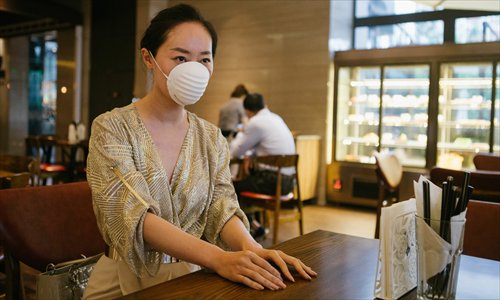Indoor air pollution deadlier than those outdoors, especially in summer time, experts say

World Health Organization report reiterates the hazards of indoor air pollution. Photo: Li Hao/GT
"I'm tired of waking up to a disgusting and suffocating smell," said Wang Jinchen, a postgraduate student at Beijing Foreign Studies University. "But that's always the beginning of my day."
As the summer heats up, Wang has become more uncomfortable indoors. It might be because indoor air pollution reaches its peak in the summer when high temperatures and humidity increase the growth of illness-causing bacteria indoors, according to a China National Radio report on June 6.
Wang stays inside mainly to escape the heat. "If it is not that hot, I would stay outside because I think the air is better outdoors - unless there is severe smog," she said.
Wang is not far from the truth. According to the World Health Organization (WHO), indoor air pollution is deadlier than pollution in the atmosphere. Every year, 4.3 million deaths occur from exposure to indoor air pollution, and 3.7 million deaths are attributable to outdoor air pollution, a May 27 WHO report said.
The reiterated fact has attracted much attention in China while the early summer's increasing temperature is seen as another potential hazard related to indoor air pollution, according to the China National Radio report. When indoor pollutants become too concentrated, people can develop allergies and respiratory diseases.
Dai Zizhu, a research fellow at the Chinese Center for Disease Control and Prevention, told China National Radio that people living in Beijing should pay more attention to indoor air pollution because the air quality inside and outside are interrelated. "Indoor air pollution will increase in accordance with that outdoor, especially in Beijing, where the smog is so severe," Dai said.
Song Guangsheng, the vice president of the China National Interior Decoration Association, shares Dai's opinion. Song said at a seminar on interior air quality in Beijing on June 5 that people breathe in four times as much particulate matter indoors than outdoors in Beijing because they spend 70 to 90 percent of their time indoors.
Many people in Beijing think that outdoor pollutants like fog are the cause of indoor air pollution, but they may be wrong. According to a 2015 Xinhua News Agency report, a Tsinghua University study on indoor air pollution published in April 2015 found that activities such as smoking indoors and cooking are the leading cause of indoor air pollution.
The article suggested that people should open their windows and doors to let fresh air circulate when the outdoor PM2.5 is lower than 75 micrograms per cubic meter.
Seasonal changes are also closely related to indoor air pollution, People's Daily website reported in 2015. According to the report, the heavy use of air conditioning in the summer exacerbates indoor air pollution because it reduces air flow. Also, large amounts of bacteria and mold inside the air conditioning unit can cause secondary air pollution indoors, which is a direct health hazard.
According to a 2013 Xinmin Weekly report, TUV Rheinland, a German third party environmental inspection, testing, and certification center, suggested that people keep the humidity inside their homes at about 40 to 50 percent to prevent the development of mold and other harmful microorganisms. The center also recommended reducing the amount of artificial fragrances used indoors because they can give off harmful organic compounds.
Overwhelmed, and not knowing what she should do, Wang has decided to wear a mask indoors. "I can't imagine a better way," he said.
Newspaper headline: Perils in the room